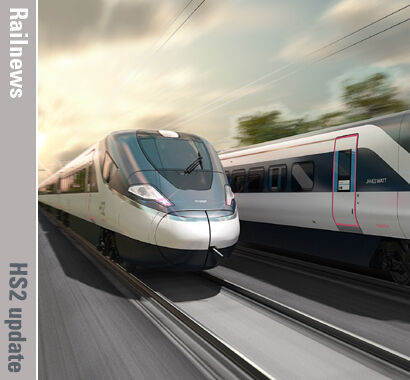The High Court has granted an ‘extensive’ injunction to HS2 Ltd, which will make disrupting construction work or entering HS2 sites without permission a potential contempt of court. Jail sentences can be given in contempt cases.
Mr Justice Julian Knowles, sitting in Birmingham, said the terms of the injunction struck ‘a fair balance between the rights of the individual protestors and the general right and interests of HS2 and others who are being affected by the protests, including the national economy’.
Memories are still fresh of a major protest in and under Euston Square Gardens in London at the start of last year, which is also an HS2 worksite. Tunnellers under the gardens were eventually ‘dragged out’ after several weeks of resistance.
HS2 Ltd welcomed the new judgment, and said it was ‘not intended to stop legitimate protest’, but opponents say it will ‘stifle’ peaceful opposition and will even obstruct specialists like ecologists who have a reason to keep an eye on the construction.
Because the injunction applies throughout the route of HS2, lawyers say it is one of the most far-reaching of its kind ever granted in an English court. It was also a complex case, including almost 8,000 pages of evidence, and the judge needed more than four months to reach his decision.
In giving his judgment, Mr Justice Knowles said he was ‘satisfied that there has been significant violence, criminality and sometimes risk to the life of the activists, HS2 staff and contractors’.
He had ‘anxiously considered the geographical extent of the injunction along the whole of the HS2 route’, and had decided that ‘such an extensive injunction is appropriate’.
HS2 Ltd said: ‘We hope the injunction will prevent the violence, intimidation, and criminal damage these protests have frequently caused, harming the HS2 project and those working on it, and costing the UK taxpayer millions of pounds.’
HS2 opponent Mark Keir said there had been ‘no justice’ and dubbed the injunction ‘a democracy-crippling decision’ which he condemned as ‘deeply worrying’. It had also been argued that some people could find themselves in breach of the injunction without realising it, because ‘Notwithstanding the 283 pages of maps which have been produced, the breadth scope and complexity of the land subject to the proposed injunction is such that it is in practical terms not possible for persons to reliably ascertain the scope of the injunction.’
The ruling has also fuelled an existing argument about footpaths. The Chiltern Society has pointed out that many have been diverted, and that walkers could now stray innocently into areas protected by the court ruling.
Matthew Stanton, who is head of planning and advocacy at Berks, Bucks & Oxon Wildlife Trust, said: ‘We are concerned about the impact the injunction will have on people's ability to monitor the work HS2 is doing in terms of ecological impact and that's because we have already had experiences where people feel intimidated going near HS2 land and we are concerned that security staff of HS2 will feel even more emboldened with such an injunction behind them.
‘It's one thing trying to stop people having illegal camps on HS2 land but, if that is what HS2 wants, then just have an injunction that says that. Don't have a catch-all injunction that basically means they can threaten to imprison anyone who even slightly affects their operations.’


